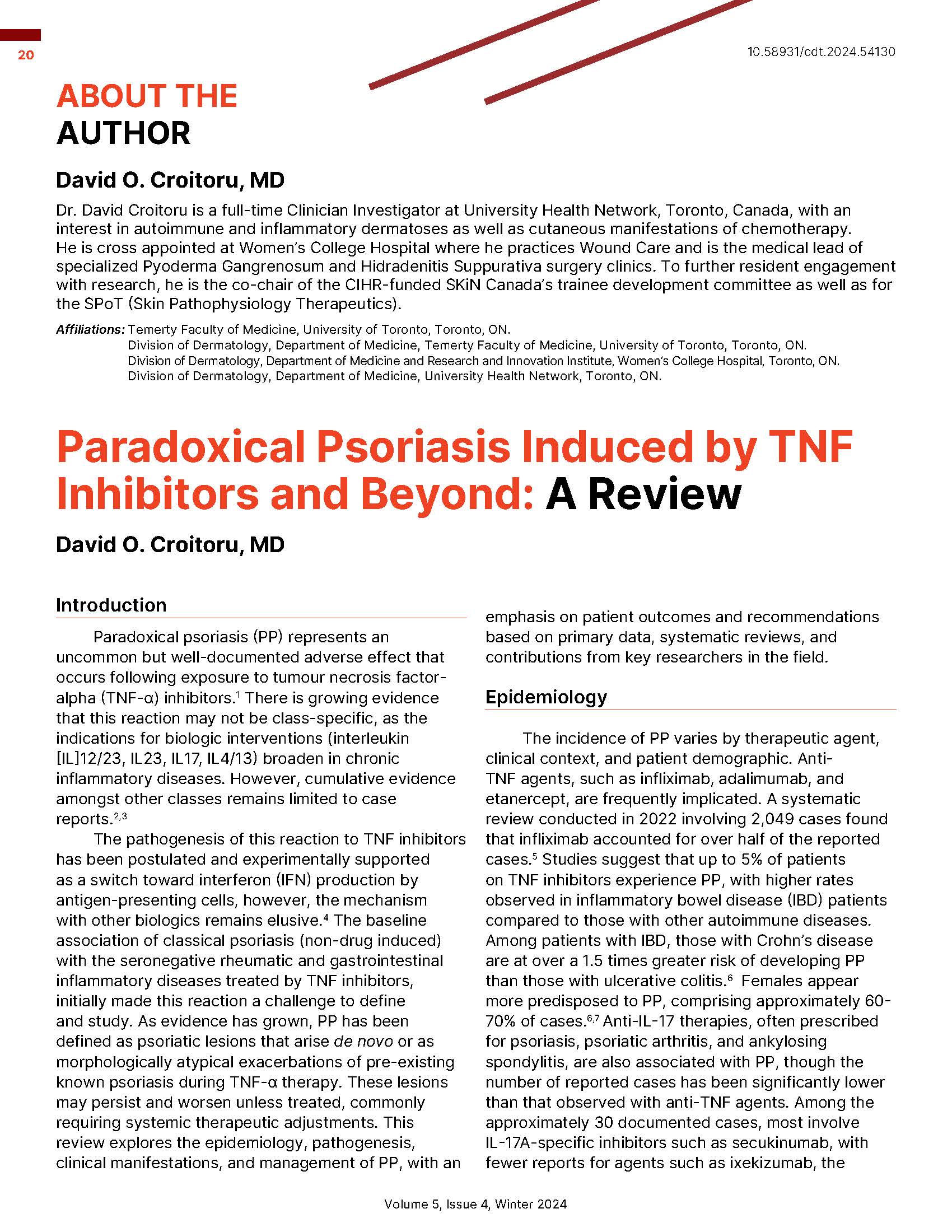Paradoxical Psoriasis Induced by TNF Inhibitors and Beyond: A Review
DOI:
https://doi.org/10.58931/cdt.2024.54130Abstract
Paradoxical psoriasis (PP) represents an uncommon but well-documented adverse effect that occurs following exposure to tumour necrosis factor-alpha (TNF-α) inhibitors. There is growing evidence that this reaction may not be class-specific, as the indications for biologic interventions (interleukin [IL]12/23, IL23, IL17, IL4/13) broaden in chronic inflammatory diseases. However, cumulative evidence amongst other classes remains limited to case reports.
The pathogenesis of this reaction to TNF inhibitors has been postulated and experimentally supported as a switch toward interferon (IFN) production by antigen-presenting cells, however, the mechanism with other biologics remains elusive. The baseline association of classical psoriasis (non-drug induced) with the seronegative rheumatic and gastrointestinal inflammatory diseases treated by TNF inhibitors, initially made this reaction a challenge to define and study. As evidence has grown, PP has been defined as psoriatic lesions that arise de novo or as morphologically atypical exacerbations of pre-existing known psoriasis during TNF-α therapy. These lesions may persist and worsen unless treated, commonly requiring systemic therapeutic adjustments. This review explores the epidemiology, pathogenesis, clinical manifestations, and management of PP, with an emphasis on patient outcomes and recommendations based on primary data, systematic reviews, and contributions from key researchers in the field.
References
Tillack C, Ehmann LM, Friedrich M, Laubender RP, Papay P, Vogelsang H, et al. Anti-TNF antibody-induced psoriasiform skin lesions in patients with inflammatory bowel disease are characterised by interferon-γ-expressing Th1 cells and IL-17A/IL-22-expressing Th17 cells and respond to anti-IL-12/IL-23 antibody treatment. Gut. 2014;63(4):567-577. doi:10.1136/gutjnl-2012-302853
Klimko A, Olteanu AO, Tieranu I, Orzan OA, Toma CV, Ionescu EM, et al. Paradoxical psoriasis induced by ustekinumab: a comprehensive review and case report. Medicina (Kaunas). 2024;60(1). doi:10.3390/medicina60010106
Brumfiel CM, Patel MH, Zirwas MJ. Development of psoriasis during treatment with dupilumab: a systematic review. J Am Acad Dermatol. 2022;86(3):708-709. doi:10.1016/j.jaad.2021.05.013
Conrad C, Di Domizio J, Mylonas A, Belkhodja C, Demaria O, Navarini AA, et al. TNF blockade induces a dysregulated type I interferon response without autoimmunity in paradoxical psoriasis. Nat Commun. 2018;9(1):25. doi:10.1038/s41467-017-02466-4
Murphy MJ, Cohen JM, Vesely MD, Damsky W. Paradoxical eruptions to targeted therapies in dermatology: a systematic review and analysis. J Am Acad Dermatol. 2022;86(5):1080-1091. doi:10.1016/j.jaad.2020.12.010
Croitoru DO, Brooks SG, Nathanielsz N, Silverberg O, Nicolau I, Drucker AM, et al. Predictors of severity in paradoxical psoriasis from biologic therapies: a systematic review. J Am Acad Dermatol. 2023;88(2):471-473. doi:10.1016/j.jaad.2022.06.019
Brown G, Wang E, Leon A, Huynh M, Wehner M, Matro R, et al. Tumor necrosis factor-α inhibitor-induced psoriasis: systematic review of clinical features, histopathological findings, and management experience. J Am Acad Dermatol. 2017;76(2):334-341. doi:10.1016/j.jaad.2016.08.012
Alnaqbi KA, Zeyoudi JA, Fazal F, Alhaj OM, Jassim I, Albreki FA. Paradoxical psoriasis and worsening spondylitis due to secukinumab in a patient with ankylosing spondylitis: a case report and literature review. Cureus. 2023;15(12):e50726. doi:10.7759/cureus.50726
Moran B, Gallagher C, Tobin AM, Fletcher JM. Enrichment of polyfunctional IL-17-producing T cells in paradoxical psoriasis skin lesions. J Invest Dermatol. 2020;140(5):1094-1097. doi:10.1016/j.jid.2019.10.010
Safa G, Paumier V. Psoriasis induced by dupilumab therapy. Clin Exp Dermatol. 2019;44(3):e49-e50. doi:10.1111/ced.13901
Ahmad M, Murphy MJ, Damsky W, Leventhal J. Dupilumab-induced psoriasis in the setting of pembrolizumab therapy: an analysis of cytokine expression. Int J Dermatol. 2023;62(8):e424-e426. doi:10.1111/ijd.16538
Guttman-Yassky E, Krueger JG. Atopic dermatitis and psoriasis: two different immune diseases or one spectrum? Curr Opin Immunol. 2017;48:68-73. doi:10.1016/j.coi.2017.08.008
Maronese CA, Valenti M, Moltrasio C, Romagnuolo M, Ferrucci SM, Gilliet M, et al. Paradoxical psoriasis: an updated review of clinical features, pathogenesis, and treatment options. J Invest Dermatol. 2024;144(11):2364-2376. doi:10.1016/j.jid.2024.05.015
Böhner A, Jargosch M, Müller NS, Garzorz-Stark N, Pilz C, Lauffer F, et al. The neglected twin: Nummular eczema is a variant of atopic dermatitis with codominant T(H)2/T(H)17 immune response. J Allergy Clin Immunol. 2023;152(2):408-419. doi:10.1016/j.jaci.2023.04.009
Mazloom SE, Yan D, Hu JZ, Ya J, Husni ME, Warren CB, et al. TNF-α inhibitor-induced psoriasis: a decade of experience at the Cleveland Clinic. J Am Acad Dermatol. 2020;83(6):1590-1598. doi:10.1016/j.jaad.2018.12.018
Karadeniz H, Ataş N, Avanoğlu Güler A, Tufan A. Treatment of anti-TNF-related paradoxic palmoplantar psoriasis in Behçet's disease with azathioprine. Clin Exp Rheumatol. 2019;37 Suppl 121(6):168.


